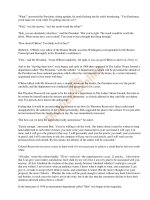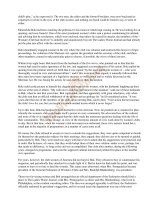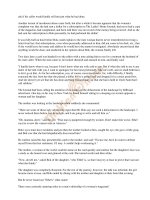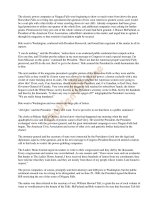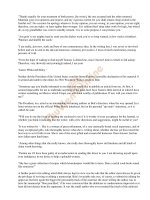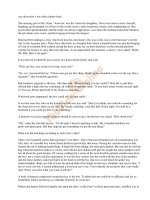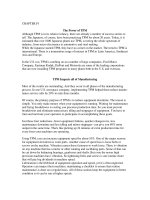Tài liệu The Americanization of Edward Bok 4 docx
Bạn đang xem bản rút gọn của tài liệu. Xem và tải ngay bản đầy đủ của tài liệu tại đây (166.59 KB, 10 trang )
wizard of Wall Street." One day, the financier had to dictate a contract, and, coming into Mr. Cary's office,
decided to dictate it then and there. An hour afterward Edward delivered the copy of the contract to Mr.
Gould, and the financier was so struck by its accuracy and by the legibility of the handwriting that afterward
he almost daily "happened in" to dictate to Mr. Cary's stenographer. Mr. Gould's private stenographer was in
his own office in lower Broadway; but on his way down-town in the morning Mr. Gould invariably stopped at
the Western Union Building, at 195 Broadway, and the habit resulted in the installation of a private office
there. He borrowed Edward to do his stenography. The boy found himself taking not only letters from Mr.
Gould's dictation, but, what interested him particularly, the financier's orders to buy and sell stock.
Edward watched the effects on the stock-market of these little notes which he wrote out and then shot through
a pneumatic tube to Mr. Gould's brokers. Naturally, the results enthralled the boy, and he told Mr. Cary about
his discoveries. This, in turn, interested Mr. Cary; Mr. Gould's dictations were frequently given in Mr. Cary's
own office, where, as his desk was not ten feet from that of his stenographer, the attorney heard them, and
began to buy and sell according to the magnate's decisions.
Edward had now become tremendously interested in the stock game which he saw constantly played by the
great financier; and having a little money saved up, he concluded that he would follow in the wake of Mr.
Gould's orders. One day, he naively mentioned his desire to Mr. Gould, when the financier seemed in a
particularly favorable frame of mind; but Edward did not succeed in drawing out the advice he hoped for. "At
least," reasoned Edward, "he knew of my intention; and if he considered it a violation of confidence he would
have said as much."
Construing the financier's silence to mean at least not a prohibition, Edward went to his Sunday-school
teacher, who was a member of a Wall Street brokerage firm, laid the facts before him, and asked him if he
would buy for him some Western Union stock. Edward explained, however, that somehow he did not like the
gambling idea of buying "on margin," and preferred to purchase the stock outright. He was shown that this
would mean smaller profits; but the boy had in mind the loss of his father's fortune, brought about largely by
"stock margins," and he did not intend to follow that example. So, prudently, under the brokerage of his
Sunday-school teacher, and guided by the tips of no less a man than the controlling factor of stock-market
finance, Edward Bok took his first plunge in Wall Street!
Of course the boy's buying and selling tallied precisely with the rise and fall of Western Union stock. It could
scarcely have been otherwise. Jay Gould had the cards all in his hands; and as he bought and sold, so Edward
bought and sold. The trouble was, the combination did not end there, as Edward might have foreseen had he
been older and thus wiser. For as Edward bought and sold, so did his Sunday-school teacher, and all his
customers who had seen the wonderful acumen of their broker in choosing exactly the right time to buy and
sell Western Union. But Edward did not know this.
One day a rumor became current on the Street that an agreement had been reached by the Western Union
Company and its bitter rival, the American Union Telegraph Company, whereby the former was to absorb the
latter. Naturally, the report affected Western Union stock. But Mr. Gould denied it in toto; said the report was
not true, no such consolidation was in view or had even been considered. Down tumbled the stock, of course.
But it so happened that Edward knew the rumor was true, because Mr. Gould, some time before, had
personally given him the contract of consolidation to copy. The next day a rumor to the effect that the
American Union was to absorb the Western Union appeared on the first page of every New York newspaper.
Edward knew exactly whence this rumor emanated. He had heard it talked over. Again, Western Union stock
dropped several points. Then he noticed that Mr. Gould became a heavy buyer. So became Edward as heavy
as he could. Jay Gould pooh-poohed the latest rumor. The boy awaited developments.
On Sunday afternoon, Edward's Sunday-school teacher asked the boy to walk home with him, and on reaching
the house took him into the study and asked him whether he felt justified in putting all his savings in Western
The Legal Small Print 36
Union just at that time when the price was tumbling so fast and the market was so unsteady. Edward assured
his teacher that he was right, although he explained that he could not disclose the basis of his assurance.
Edward thought his teacher looked worried, and after a little there came the revelation that he, seeing that
Edward was buying to his limit, had likewise done so. But the broker had bought on margin, and had his
margin wiped out by the decline in the stock caused by the rumors. He explained to Edward that he could
recoup his losses, heavy though they were in fact, he explained that nearly everything he possessed was
involved if Edward's basis was sure and the stock would recover.
Edward keenly felt the responsibility placed upon him. He could never clearly diagnose his feelings when he
saw his teacher in this new light. The broker's "customers" had been hinted at, and the boy of eighteen
wondered how far his responsibility went, and how many persons were involved. But the deal came out all
right, for when, three days afterward, the contract was made public, Western Union, of course, skyrocketed,
Jay Gould sold out, Edward sold out, the teacher-broker sold out, and all the customers sold out!
How long a string it was Edward never discovered, but he determined there and then to end his Wall Street
experience; his original amount had multiplied; he was content to let well enough alone, and from that day to
this Edward Bok has kept out of Wall Street. He had seen enough of its manipulations; and, although on "the
inside," he decided that the combination of his teacher and his customers was a responsibility too great for
him to carry.
Furthermore, Edward decided to leave the Western Union. The longer he remained, the less he liked its
atmosphere. And the closer his contact with Jay Gould the more doubtful he became of the wisdom of such an
association and perhaps its unconscious influence upon his own life in its formative period.
In fact, it was an experience with Mr. Gould that definitely fixed Edward's determination. The financier
decided one Saturday to leave on a railroad inspection tour on the following Monday. It was necessary that a
special meeting of one of his railroad interests should be held before his departure, and he fixed the meeting
for Sunday at eleven-thirty at his residence on Fifth Avenue. He asked Edward to be there to take the notes of
the meeting.
The meeting was protracted, and at one o'clock Mr. Gould suggested an adjournment for luncheon, the
meeting to reconvene at two. Turning to Edward, the financier said: "You may go out to luncheon and return
in an hour." So, on Sunday afternoon, with the Windsor Hotel on the opposite corner as the only visible place
to get something to eat, but where he could not afford to go, Edward, with just fifteen cents in his pocket, was
turned out to find a luncheon place.
He bought three apples for five cents all that he could afford to spend, and even this meant that he must walk
home from the ferry to his house in Brooklyn and these he ate as he walked up and down Fifth Avenue until
his hour was over. When the meeting ended at three o'clock, Mr. Gould said that, as he was leaving for the
West early next morning, he would like Edward to write out his notes, and have them at his house by eight
o'clock. There were over forty note-book pages of minutes. The remainder of Edward's Sunday afternoon and
evening was spent in transcribing the notes. By rising at half past five the next morning he reached Mr.
Gould's house at a quarter to eight, handed him the minutes, and was dismissed without so much as a word of
thanks or a nod of approval from the financier.
Edward felt that this exceeded the limit of fair treatment by employer of employee. He spoke of it to Mr.
Cary, and asked whether he would object if he tried to get away from such influence and secure another
position. His employer asked the boy in which direction he would like to go, and Edward unhesitatingly
suggested the publishing business. He talked it over from every angle with his employer, and Mr. Cary not
only agreed with him that his decision was wise, but promised to find him a position such as he had in mind.
The Legal Small Print 37
It was not long before Mr. Cary made good his word, and told Edward that his friend Henry Holt, the
publisher, would like to give him a trial.
The day before he was to leave the Western Union Telegraph Company the fact of his resignation became
known to Mr. Gould. The financier told the boy there was no reason for his leaving, and that he would
personally see to it that a substantial increase was made in his salary. Edward explained that the salary, while
of importance to him, did not influence him so much as securing a position in a business in which he felt he
would be happier.
"And what business is that?" asked the financier.
"The publishing of books," replied the boy.
"You are making a great mistake," answered the little man, fixing his keen gray eyes on the boy. "Books are a
luxury. The public spends its largest money on necessities: on what it can't do without. It must telegraph; it
need not read. It can read in libraries. A promising boy such as you are, with his life before him, should
choose the right sort of business, not the wrong one."
But, as facts proved, the "little wizard of Wall Street" was wrong in his prediction; Edward Bok was not
choosing the wrong business.
Years afterward when Edward was cruising up the Hudson with a yachting party one Saturday afternoon, the
sight of Jay Gould's mansion, upon approaching Irvington, awakened the desire of the women on board to see
his wonderful orchid collection. Edward explained his previous association with the financier and offered to
recall himself to him, if the party wished to take the chance of recognition. A note was written to Mr. Gould,
and sent ashore, and the answer came back that they were welcome to visit the orchid houses. Jay Gould, in
person, received the party, and, placing it under the personal conduct of his gardener, turned to Edward and,
indicating a bench, said: "Come and sit down here with me."
"Well," said the financier, who was in his domestic mood, quite different from his Wall Street aspect, "I see in
the papers that you seem to be making your way in the publishing business."
Edward expressed surprise that the Wall Street magnate had followed his work.
"I have because I always felt you had it in you to make a successful man. But not in that business," he added
quickly. "You were born for the Street. You would have made a great success there, and that is what I had in
mind for you. In the publishing business you will go just so far; in the Street you could have gone as far as
you liked. There is room there; there is none in the publishing business. It's not too late now, for that matter,"
continued the "little wizard," fastening his steel eyes on the lad beside him!
And Edward Bok has often speculated whither Jay Gould might have led him. To many a young man, a
suggestion from such a source would have seemed the one to heed and follow. But Edward Bok's instinct
never failed him. He felt that his path lay far apart from that of Jay Gould and the farther the better!
In 1882 Edward, with a feeling of distinct relief, left the employ of the Western Union Telegraph Company
and associated himself with the publishing business in which he had correctly divined that his future lay.
His chief regret on leaving his position was in severing the close relations, almost as of father and son,
between Mr. Cary and himself. When Edward was left alone, with the passing away of his father, Clarence
Cary had put his sheltering arm around the lonely boy, and with the tremendous encouragement of the phrase
that the boy never forgot, "I think you have it in you, Edward, to make a successful man," he took him under
his wing. It was a turning-point in Edward Bok's life, as he felt at the time and as he saw more clearly
The Legal Small Print 38
afterward.
He remained in touch with his friend, however, keeping him advised of his progress in everything he did, not
only at that time, but all through his later years. And it was given to Edward to feel the deep satisfaction of
having Mr. Cary say, before he passed away, that the boy had more than justified the confidence reposed in
him. Mr. Cary lived to see him well on his way, until, indeed, Edward had had the proud happiness of
introducing to his benefactor the son who bore his name, Cary William Bok.
VIII. Starting a Newspaper Syndicate
Edward felt that his daytime hours, spent in a publishing atmosphere as stenographer with Henry Holt and
Company, were more in line with his editorial duties during the evenings. The Brooklyn Magazine was now
earning a comfortable income for its two young proprietors, and their backers were entirely satisfied with the
way it was being conducted. In fact, one of these backers, Mr. Rufus T. Bush, associated with the Standard
Oil Company, who became especially interested, thought he saw in the success of the two boys a possible
opening for one of his sons, who was shortly to be graduated from college. He talked to the publisher and
editor about the idea, but the boys showed by their books that while there was a reasonable income for them,
not wholly dependent on the magazine, there was no room for a third.
Mr. Bush now suggested that he buy the magazine for his son, alter its name, enlarge its scope, and make of it
a national periodical. Arrangements were concluded, those who had financially backed the venture were fully
paid, and the two boys received a satisfactory amount for their work in building up the magazine. Mr. Bush
asked Edward to suggest a name for the new periodical, and in the following month of May, 1887, The
Brooklyn Magazine became The American Magazine, with its publication office in New York. But, though a
great deal of money was spent on the new magazine, it did not succeed. Mr. Bush sold his interest in the
periodical, which, once more changing its name, became The Cosmopolitan Magazine. Since then it has
passed through the hands of several owners, but the name has remained the same. Before Mr. Bush sold The
American Magazine he had urged Edward to come back to it as its editor, with promise of financial support;
but the young man felt instinctively that his return would not be wise. The magazine had been The
Cosmopolitan only a short time when the new owners, Mr. Paul J. Slicht and Mr. E. D. Walker, also solicited
the previous editor to accept reappointment. But Edward, feeling that his baby had been rechristened too often
for him to father it again, declined the proposition. He had not heard the last of it, however, for, by a curious
coincidence, its subsequent owner, entirely ignorant of Edward's previous association with the magazine,
invited him to connect himself with it. Thus three times could Edward Bok have returned to the magazine for
whose creation he was responsible.
Edward was now without editorial cares; but he had already, even before disposing of the magazine,
embarked on another line of endeavor. In sending to a number of newspapers the advance sheets of a
particularly striking "feature" in one of his numbers of The Brooklyn Magazine, it occurred to him that he was
furnishing a good deal of valuable material to these papers without cost. It is true his magazine was receiving
the advertising value of editorial comment; but the boy wondered whether the newspapers would not be
willing to pay for the privilege of simultaneous publication. An inquiry or two proved that they would. Thus
Edward stumbled upon the "syndicate" plan of furnishing the same article to a group of newspapers, one in
each city, for simultaneous publication. He looked over the ground, and found that while his idea was not a
new one, since two "syndicate" agencies already existed, the field was by no means fully covered, and that the
success of a third agency would depend entirely upon its ability to furnish the newspapers with material
equally good or better than they received from the others. After following the material furnished by these
agencies for two or three weeks, Edward decided that there was plenty of room for his new ideas.
He discussed the matter with his former magazine partner, Colver, and suggested that if they could induce Mr.
Beecher to write a weekly comment on current events for the newspapers it would make an auspicious
beginning. They decided to talk it over with the famous preacher. For to be a "Plymouth boy" that is, to go to
The Legal Small Print 39
the Plymouth Church Sunday-school and to attend church there was to know personally and become devoted
to Henry Ward Beecher. And the two were synonymous. There was no distance between Mr. Beecher and his
"Plymouth boys." Each understood the other. The tie was that of absolute comradeship.
"I don't believe in it, boys," said Mr. Beecher when Edward and his friend broached the syndicate letter to
him. "No one yet ever made a cent out of my supposed literary work."
All the more reason, was the argument, why some one should.
Mr. Beecher smiled! How well he knew the youthful enthusiasm that rushes in, etc.
"Well, all right, boys! I like your pluck," he finally said. "I'll help you if I can."
The boys agreed to pay Mr. Beecher a weekly sum of two hundred and fifty dollars which he knew was
considerable for them.
When the first article had been written they took him their first check. He looked at it quizzically, and then at
the boys. Then he said simply: "Thank you." He took a pin and pinned the check to his desk. There it
remained, much to the curiosity of the two boys.
The following week he had written the second article and the boys gave him another check. He pinned that up
over the other. "I like to look at them," was his only explanation, as he saw Edward's inquiring glance one
morning.
The third check was treated the same way. When the boys handed him the fourth, one morning, as he was
pinning it up over the others, he asked: "When do you get your money from the newspapers?"
He was told that the bills were going out that morning for the four letters constituting a month's service.
"I see," he remarked.
A fortnight passed, then one day Mr. Beecher asked: "Well, how are the checks coming in?"
"Very well," he was assured.
"Suppose you let me see how much you've got in," he suggested, and the boys brought the accounts to him.
After looking at them he said: "That's very interesting. How much have you in the bank?"
He was told the balance, less the checks given to him. "But I haven't turned them in yet," he explained.
"Anyhow, you have enough in bank to meet the checks you have given me, and a profit besides, haven't you?"
He was assured they had.
Then, taking his bank-book from a drawer, he unpinned the six checks on his desk, indorsed each thus: wrote
a deposit-slip, and, handing the book to Edward, said:
For deposit (??) in Bank H. W. Beecher
"Just hand that in at the bank as you go by, will you?"
Edward was very young then, and Mr. Beecher's methods of financiering seemed to him quite in line with
The Legal Small Print 40
current notions of the Plymouth pastor's lack of business knowledge. But as the years rolled on the incident
appeared in a new light a striking example of the great preacher's wonderful considerateness.
Edward had offered to help Mr. Beecher with his correspondence; at the close of one afternoon, while he was
with the Plymouth pastor at work, an organ-grinder and a little girl came under the study window. A cold,
driving rain was pelting down. In a moment Mr. Beecher noticed the girl's bare toes sticking out of her worn
shoes.
He got up, went into the hall, and called for one of his granddaughters.
"Got any good, strong rain boots?" he asked when she appeared.
"Why, yes, grandfather. Why?" was the answer.
"More than one pair?" Mr. Beecher asked.
"Yes, two or three, I think."
"Bring me your strongest pair, will you, dear?" he asked. And as the girl looked at him with surprise he said:
"Just one of my notions."
"Now, just bring that child into the house and put them on her feet for me, will you?" he said when the shoes
came. "I'll be able to work so much better."
One rainy day, as Edward was coming up from Fulton Ferry with Mr. Beecher, they met an old woman
soaked with the rain. "Here, you take this, my good woman," said the clergyman, putting his umbrella over
her head and thrusting the handle into the astonished woman's hand. "Let's get into this," he said to Edward
simply, as he hailed a passing car.
"There is a good deal of fraud about beggars," he remarked as he waved a sot away from him one day; "but
that doesn't apply to women and children," he added; and he never passed such mendicants without stopping.
All the stories about their being tools in the hands of accomplices failed to convince him. "They're women and
children," he would say, and that settled it for him.
"What's the matter, son? Stuck?" he said once to a newsboy who was crying with a heavy bundle of papers
under his arm.
"Come along with me, then," said Mr. Beecher, taking the boy's hand and leading him into the newspaper
office a few doors up the street.
"This boy is stuck," he simply said to the man behind the counter. "Guess The Eagle can stand it better than
this boy; don't you think so?"
To the grown man Mr. Beecher rarely gave charity. He believed in a return for his alms.
"Why don't you go to work?" he asked of a man who approached him one day in the street.
"Can't find any," said the man.
"Looked hard for it?" was the next question.
"I have," and the man looked Mr. Beecher in the eye.
The Legal Small Print 41
"Want some?" asked Mr. Beecher.
"I do," said the man.
"Come with me," said the preacher. And then to Edward, as they walked along with the man following
behind, he added: "That man is honest."
"Let this man sweep out the church," he said to the sexton when they had reached Plymouth Church.
"But, Mr. Beecher," replied the sexton with wounded pride, "it doesn't need it."
"Don't tell him so, though," said Mr. Beecher with a merry twinkle of the eye; and the sexton understood.
Mr. Beecher was constantly thoughtful of a struggling young man's welfare, even at the expense of his own
material comfort. Anxious to save him from the labor of writing out the newspaper articles, Edward, himself
employed during the daylight hours which Mr. Beecher preferred for his original work, suggested a
stenographer. The idea appealed to Mr. Beecher, for he was very busy just then. He hesitated, but as Edward
persisted, he said: "All right; let him come to-morrow."
The next day he said: "I asked that stenographer friend of yours not to come again. No use of my trying to
dictate. I am too old to learn new tricks. Much easier for me to write myself."
Shortly after that, however, Mr. Beecher dictated to Edward some material for a book he was writing. Edward
naturally wondered at this, and asked the stenographer what had happened.
"Nothing," he said. "Only Mr. Beecher asked me how much it would cost you to have me come to him each
week. I told him, and then he sent me away."
That was Henry Ward Beecher!
Edward Bok was in the formative period between boyhood and young manhood when impressions meant
lessons, and associations meant ideals. Mr. Beecher never disappointed. The closer one got to him, the greater
he became in striking contrast to most public men, as Edward had already learned.
Then, his interests and sympathies were enormously wide. He took in so much! One day Edward was walking
past Fulton Market, in New York City, with Mr. Beecher.
"Never skirt a market," the latter said; "always go through it. It's the next best thing, in the winter, to going
South."
Of course all the marketmen knew him, and they knew, too, his love for green things.
"What do you think of these apples, Mr. Beecher?" one marketman would stop to ask.
Mr. Beecher would answer heartily: "Fine! Don't see how you grow them. All that my trees bear is a crop of
scale. Still, the blossoms are beautiful in the spring, and I like an apple-leaf. Ever examine one?" The
marketman never had. "Well, now, do, the next time you come across an apple-tree in the spring."
And thus he would spread abroad an interest in the beauties of nature which were commonly passed over.
"Wonderful man, Beecher is," said a market dealer in green goods once. "I had handled thousands of bunches
of celery in my life and never noticed how beautiful its top leaves were until he picked up a bunch once and
The Legal Small Print 42
told me all about it. Now I haven't the heart to cut the leaves off when a customer asks me."
His idea of his own vegetable-gardening at Boscobel, his Peekskill home, was very amusing. One day Edward
was having a hurried dinner, preparatory to catching the New York train. Mr. Beecher sat beside the boy,
telling him of some things he wished done in Brooklyn.
"No, I thank you," said Edward, as the maid offered him some potatoes.
"Look here, young man," said Mr. Beecher, "don't pass those potatoes so lightly. They're of my own
raising and I reckon they cost me about a dollar a piece," he added with a twinkle in his eye.
He was an education in so many ways! One instance taught Edward the great danger of passionate speech that
might unconsciously wound, and the manliness of instant recognition of the error. Swayed by an occasion, or
by the responsiveness of an audience, Mr. Beecher would sometimes say something which was not meant as it
sounded. One evening, at a great political meeting at Cooper Union, Mr. Beecher was at his brightest and
wittiest. In the course of his remarks he had occasion to refer to ex-President Hayes; some one in the audience
called out: "He was a softy!"
"No," was Mr. Beecher's quick response. "The country needed a poultice at that time, and got it."
"He's dead now, anyhow," responded the voice.
"Not dead, my friend: he only sleepeth."
It convulsed the audience, of course, and the reporters took it down in their books.
After the meeting Edward drove home with Mr. Beecher. After a while he asked: "Well, how do you think it
went?"
Edward replied he thought it went very well, except that he did not like the reference to ex-President Hayes.
"What reference? What did I say?"
Edward repeated it.
"Did I say that?" he asked. Edward looked at him. Mr. Beecher's face was tense. After a few moments he said:
"That's generally the way with extemporaneous remarks: they are always dangerous. The best impromptu
speeches and remarks are the carefully prepared kind," he added.
Edward told him he regretted the reference because he knew that General Hayes would read it in the New
York papers, and he would be nonplussed to understand it, considering the cordial relations which existed
between the two men. Mr. Beecher knew of Edward's relations with the ex-President, and they had often
talked of him together.
Nothing more was said of the incident. When the Beecher home was reached Mr. Beecher said: "Just come in
a minute." He went straight to his desk, and wrote and wrote. It seemed as if he would never stop. At last he
handed Edward an eight-page letter, closely written, addressed to General Hayes.
"Read that, and mail it, please, on your way home. Then it'll get there just as quickly as the New York papers
will."
It was a superbly fine letter, one of those letters which only Henry Ward Beecher could write in his tenderest
The Legal Small Print 43
moods. And the reply which came from Fremont, Ohio, was no less fine!
IX. Association with Henry Ward Beecher
As a letter-writer, Henry Ward Beecher was a constant wonder. He never wrote a commonplace letter. There
was always himself in it in whatever mood it found him.
It was not customary for him to see all his mail. As a rule Mrs. Beecher opened it, and attended to most of it.
One evening Edward was helping Mrs. Beecher handle an unusually large number of letters. He was reading
one when Mr. Beecher happened to come in and read what otherwise he would not have seen:
"Reverend Henry Ward Beecher.
"Dear Sir:
"I journeyed over from my New York hotel yesterday morning to hear you preach, expecting, of course, to
hear an exposition of the gospel of Jesus Christ. Instead, I heard a political harangue, with no reason or
cohesion in it. You made an ass of yourself.
"Very truly yours, __ __.
"That's to the point," commented Mr. Beecher with a smile; and then seating himself at his desk, he turned the
sheet over and wrote:
My Dear Sir:
"I am sorry you should have taken so long a journey to hear Christ preached, and then heard what you are
polite enough to call a 'political harangue.' I am sorry, too, that you think I made an ass of myself. In this
connection I have but one consolation: that you didn't make an ass of yourself. The Lord did that."
"Henry Ward Beecher.
When the Reverend T. De Witt Talmage began to come into public notice in Brooklyn, some of Mr. Beecher's
overzealous followers unwisely gave the impression that the Plymouth preacher resented sharing with another
the pulpit fame which he alone had so long unquestioningly held. Nothing, of course, was further from Mr.
Beecher's mind. As a matter of fact, the two men were exceedingly good friends. Mr. Beecher once met
Doctor Talmage in a crowded business thoroughfare, where they got so deeply interested in each other's talk
that they sat down in some chairs standing in front of a furniture store. A gathering throng of intensely amused
people soon brought the two men to the realization that they had better move. Then Mr. Beecher happened to
see that back of their heads had been, respectively, two signs: one reading, "This style $3.45," the other, "This
style $4.25."
"Well," said Mr. Beecher, as he and Doctor Talmage walked away laughing, "I was ticketed higher than you,
Talmage, anyhow."
"You're worth more," rejoined Doctor Talmage.
On another occasion, as the two men met they began to bandy each other.
"Now, Talmage," said Mr. Beecher, his eyes twinkling, "let's have it out. My people say that Plymouth holds
more people than the Tabernacle, and your folks stand up for the Tabernacle. Now which is it? What is your
estimate?"
The Legal Small Print 44
"Well, I should say that the Tabernacle holds about fifteen thousand people," said Doctor Talmage with a
smile.
"Good," said Mr. Beecher, at once catching the spirit. "And I say that Plymouth accommodates, comfortably,
twenty thousand people. Now, let's tell our respective trustees that it's settled, once for all."
Mr. Beecher could never be induced to take note of what others said of him. His friends, with more heart than
head, often tried to persuade him to answer some attack, but he invariably waved them off. He always saw the
ridiculous side of those attacks; never their serious import.
At one time a fellow Brooklyn minister, a staunch Prohibitionist, publicly reproved Mr. Beecher for being
inconsistent in his temperance views, to the extent that he preached temperance but drank beer at his own
dinner-table. This attack angered the friends of Mr. Beecher, who tried to persuade him to answer the charge.
But the Plymouth pastor refused. "Friend is a good fellow," was the only comment they could elicit.
"But he ought to be broadened," persisted the friends.
"Well now," said Mr. Beecher, "that isn't always possible. For instance," he continued, as that inimitable
merry twinkle came into his eyes, "sometime ago Friend criticised me for something I had said. I thought he
ought not to have done so, and the next time we met I told him so. He persisted, and I felt the only way to
treat him was as I would an unruly child. So I just took hold of him, laid him face down over my knee, and
proceeded to impress him as our fathers used to do of old. And, do you know, I found that the Lord had not
made a place on him for me to lay my hand upon."
And in the laughter which met this sally Mr. Beecher ended with "You see, it isn't always possible to broaden
a man."
Mr. Beecher was rarely angry. Once, however, he came near it; yet he was more displeased than angry. Some
of his family and Edward had gone to a notable public affair at the Brooklyn Academy of Music, where a box
had been placed at Mr. Beecher's disposal. One member of the family was a very beautiful girl who had
brought a girl-friend. Both were attired in full evening decollete costume. Mr. Beecher came in late from
another engagement. A chair had been kept vacant for him in the immediate front of the box, since his
presence had been widely advertised, and the audience was expecting to see him. When he came in, he doffed
his coat and was about to go to the chair reserved for him, when he stopped, stepped back, and sat down in a
chair in the rear of the box. It was evident from his face that something had displeased him. Mrs. Beecher
leaned over and asked him, but he offered no explanation. Nothing was said.
Edward went back to the house with Mr. Beecher; after talking awhile in the study, the preacher, wishing to
show him something, was going up-stairs with his guest and had nearly reached the second landing when
there was the sound of a rush, the gas was quickly turned low, and two white figures sped into one of the
rooms.
"My dears," called Mr. Beecher.
"Yes, Mr. Beecher," came a voice from behind the door of the room in question.
"Come here one minute," said Mr. Beecher.
"But we cannot," said the voice. "We are ready for bed. Wait until "
"No; come as you are," returned Mr. Beecher.
The Legal Small Print 45
